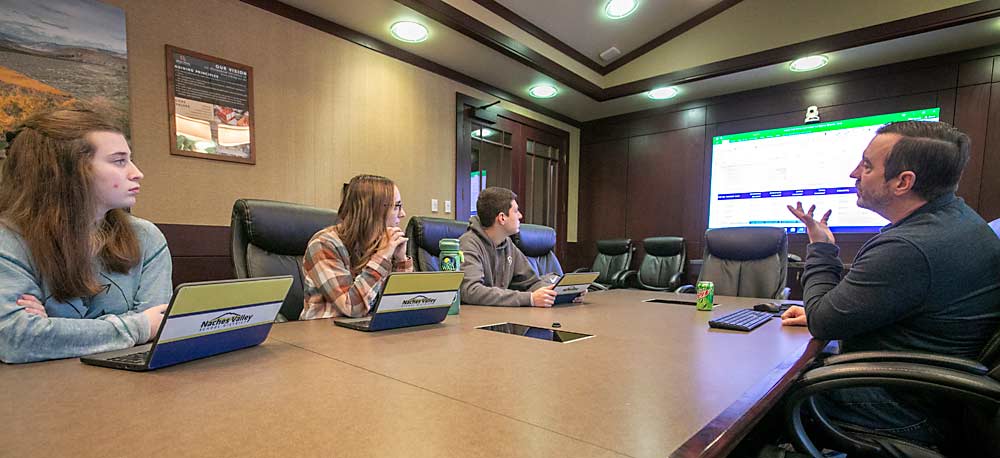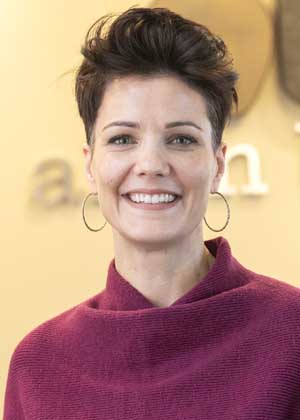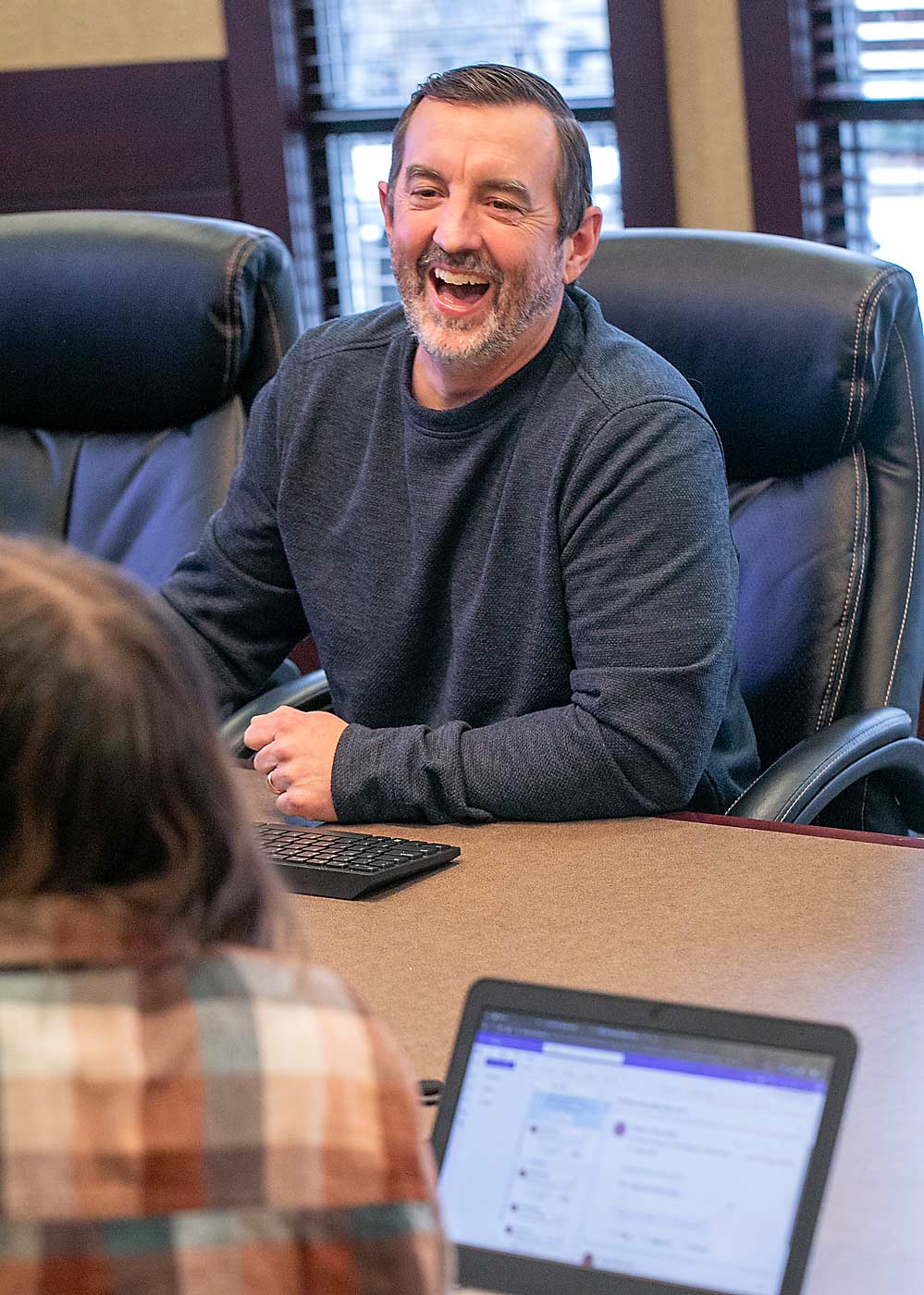—story by Kate Prengaman
—photos by TJ Mullinax

The tree fruit industry offers careers far beyond orchards, and internships can provide more than exposure to the expectations of the working world.
One company aims to provide such opportunities to the young people in its region.
“You get to see all aspects of the business, and you get to see what areas pique your interest and what don’t,” said Sarah Busey, a soon-to-be graduate of Naches Valley High School who spent a semester at fruit company Allan Bros. Inc. in its newly formed internship program. She signed up because she wanted a chance to see how a business runs before she joins the workforce herself, she said, even though she doesn’t envision a career in the fruit industry.

Borne from an already close relationship between Allan Bros., the largest employer in the small community of Naches, Washington, outside of Yakima, and the school district, the new internship program immersed three high school seniors in every aspect of fruit production, showing them the diverse career opportunities available in their hometown and giving them a head start on building professional relationships.
“Really, what it was about is how we can give these kids in our local community that opportunity to really expand their horizons a little bit, to see what might be out there,” said Allan Bros. CEO Miles Kohl.
Kohl and executive assistant Beth Kalombo, who organized the program, said they wanted to share their experience in hopes it can inspire other fruit companies and rural ag employers to do the same.

“This may sound cliche, but I like being able to influence the next generation — like you want to give back because you’ve learned some things and you want to make a difference,” Kalombo said of the program.
Their vision was to take advantage of the proximity to the high school, with its block schedule, and offer seniors a real-world elective option to “integrate them into the company,” Kohl said. Students spent theirfourth period, about an hour and 20 minutes each school day, on the fruit company’s campus or in its orchards.
The semester involved tours in each department, one-week rotations in key departments, and then a deep dive into a topic that interested them, working closely with a staff mentor. A life skill component was woven in throughout the semester, including reading and discussing the life skill book “Atomic Habits,” by James Clear. Those conversations, getting to know the students, were one of the highlights for him and many others at the company, Kohl said.
“It’s not the easiest class, but whatever you put into it, you are going to get just as much out, or more,” intern Brooke Miles said. “So many people here have been willing to help us or recommend us or just assist us in our future careers, and that is just as important as getting to know the business world, I think.”
The relationships students formed with Allan Bros. leaders were on display when Good Fruit Grower visited during a personal finance session led by Clint Novak, chief financial officer, and Derek Case, director of finance, who laughed with students as they workshopped budgets each intern drafted while envisioning life with a first job — including rent, car payments, student loan debt, retirement savings and fun money.
“Wow, that’s crazy,” said intern Nathan Beauchene, when Novak showed him how much more interest accumulates with a longer-term car loan for his dream truck.
“If you have a budget shortfall, go after the big numbers first to get more bang for your buck,” Novak said. He also stressed how saving for retirement and living well within their means, starting out as young people, will pay off in the long term.

For Beauchene, that dreamed-of first job may be working with technology in a packing house. He’s heading to Perry Technical Institute in Yakima to study instrumentation, and his internship experience, which included a special project working with All-Phase Electric contractors on the installation of new automated bagging technology, only further enforced that plan.
“I got to learn so much about automation and really got to know the whole picture,” he said.
All three inaugural interns cited the independent project as a highlight. Beauchene worked with process engineer Rob Mize, while Busey and Miles worked with research and development director Suzanne Bishop on little cherry disease.
“In a classroom, the teacher hands you assignments, you know, but we’ve been in meetings where we asked most of the questions to shape what we want to learn,” Beauchene said. “Having that kind of independence, instead of being fed or guided, has been really a highlight.”
Brian Johnson, director of career and technical education, CTE, for the Naches Valley School District, said students today are eager for on-the-job education, to see how the things they are learning matter.
Back in the day, the “three R’s” at school were reading, ’riting and ’rithmetic. Today, Johnson said, it’s “rigor, relevancy and relationships. And they hit it out of the park with this one. I think it’s going to grow as the kids spread the word.”
After Allan Bros. approached the school district with the company’s vision, Johnson got it approved as an elective credit. But the benefit for the students goes far beyond the credit, he said, citing the job skills and mentorship involved.
Next year, he hopes to have a syllabus approved so that it can be an official CTE credit, and he wants to use the framework to partner with other employers in the community as well.
“I see us forming more relationships with local companies to provide this for the kids,” Johnson said. “The start is the hardest, but we had a company like Allan Bros. to get it started for us and get us over our apprehension. The biggest thing is to get it started, even if it’s just for one kid.”
Allan Bros., for its part, plans to expand the internship program to up to five senior students for the fall semester, now that the company has had a successful first run.
“I thought if we added too many it would be too overwhelming, but it’s actually been really great, and these kids are awesome,” Kalombo. “These kids set the bar really high.”
Some members of the Allan Bros. team had been hesitant about dedicating their time to teens, Kohl said.
“They thought, ‘It’s going to be hard to translate what we do,’” he said. “But for a lot of them, it’s been very refreshing for them (to see) that there are some awesome kids out there” with hours’ worth of good questions.
But for companies that want to set up something similar, he stressed the need to have a dedicated organizer with a passion for the project — like Kalombo — to make it all happen. •






Leave A Comment